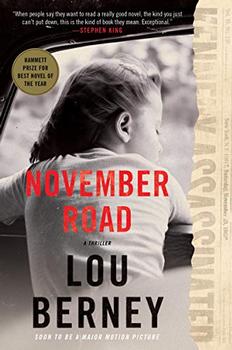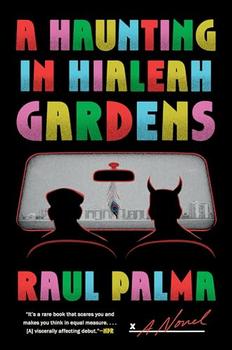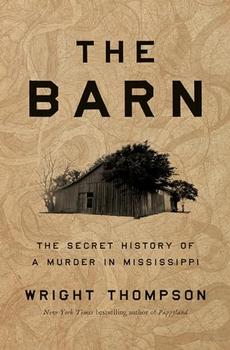Summary | Excerpt | Reviews | Beyond the Book | Read-Alikes | Genres & Themes | Author Bio

This article relates to November Road
November Road is based on one of the conspiracy theories behind President John F. Kennedy's assassination. Although outwardly, the Warren Commission that investigated the crime stated that Lee Harvey Oswald was the sole perpetrator in Dallas, it did not lay to rest the theories that have been fueled and fed since that infamous date in 1964.
Theory 1 Alleged Culprit: Mob boss Carlos Marcello
 Since Oswald was subsequently shot dead by Dallas nightclub owner Jack Ruby, and since Jack Ruby had ties to New Orleans mob boss, Carlos Marcello, there's speculation that the gangster had commissioned the assassination. By then, Marcello had had a long history of run-ins with both President Kennedy and his brother, Senator Robert Kennedy. In the late '50s, a special Senate committee was assigned to investigate mob activities. The Kennedy brothers were prominently involved in the proceedings and called Marcello to testify. The mobster refused, pleading the Fifth. The seeds of animosity grew even more when the U.S. immigration authorities apprehended Marcello and deported him to Guatemala (Marcello had procured a false Guatemalan birth certificate).
Since Oswald was subsequently shot dead by Dallas nightclub owner Jack Ruby, and since Jack Ruby had ties to New Orleans mob boss, Carlos Marcello, there's speculation that the gangster had commissioned the assassination. By then, Marcello had had a long history of run-ins with both President Kennedy and his brother, Senator Robert Kennedy. In the late '50s, a special Senate committee was assigned to investigate mob activities. The Kennedy brothers were prominently involved in the proceedings and called Marcello to testify. The mobster refused, pleading the Fifth. The seeds of animosity grew even more when the U.S. immigration authorities apprehended Marcello and deported him to Guatemala (Marcello had procured a false Guatemalan birth certificate).
Marcello was not the only mobster who was tied to these conspiracy theories. Jimmy Hoffa and Santos Trafficante were among the others whose names were tossed in the mix.
Theory 2 Alleged Culprit: Cuban government
 In 1967, the CIA director said that the agency had tried to assassinate President Fidel Castro of Cuba. There was speculation underway that such attempts had been made since the early '60s, including under the leadership of President Kennedy.
In 1967, the CIA director said that the agency had tried to assassinate President Fidel Castro of Cuba. There was speculation underway that such attempts had been made since the early '60s, including under the leadership of President Kennedy.
One of the JFK assassination conspiracy theories painted the Cuban government as having been the original mastermind. Speculation ran rife that Lee Harvey Oswald was part of a Cuban communist group that had its sights set on JFK. President Castro vehemently denied involvement: "It would have been absolute insanity by Cuba...It would have been a provocation. Needless to say, it would have been to run the risk that our country would have been destroyed by the United States. Nobody who's not insane could have thought about [killing Kennedy in retaliation]."
Theory 3 Alleged Culprit: The U.S. Secret Service
 Another strand of speculation lays the blame on the Secret Service for not having performed its functions fully in protecting the President. The House Select Committee on Assassinations absolved the agency in being complicit but did point out that the President had not been granted adequate protection in Dallas; that the Secret Service had not completely analyzed information it possessed about the Dallas trip and that the agents present in the motorcade were "inadequately prepared" to protect the President.
Another strand of speculation lays the blame on the Secret Service for not having performed its functions fully in protecting the President. The House Select Committee on Assassinations absolved the agency in being complicit but did point out that the President had not been granted adequate protection in Dallas; that the Secret Service had not completely analyzed information it possessed about the Dallas trip and that the agents present in the motorcade were "inadequately prepared" to protect the President.
The agent Roy Kellerman, seated in the right front seat, came under special fire for not having shielded the President with his body, as such a reaction would have been standard agency procedure. This strand of argument has been refuted by others who claim that the more lax detail in Dallas was at the President's own request.
President Kennedy's assassination continues to fuel theories and speculation. Director Oliver Stone's 1991 film, JFK, explored one of them. The JFK assassination conspiracy theories were spoofed in a Seinfeld episode, which recreated another popular theory, the "two shooter," by applying the same speculation to a baseball game:
Ruby, about to shoot Oswald, photograph by Jack Beers Jr., Dallas Morning News
Oswald passing out "Fair Play for Cuba" leaflets in new Orleans
Roy Kellerman in the front seat, minutes before JFK's assassination.
Filed under People, Eras & Events
![]() This "beyond the book article" relates to November Road. It originally ran in November 2018 and has been updated for the
October 2019 paperback edition.
Go to magazine.
This "beyond the book article" relates to November Road. It originally ran in November 2018 and has been updated for the
October 2019 paperback edition.
Go to magazine.




Tread softly because you tread on my dreams.
Click Here to find out who said this, as well as discovering other famous literary quotes!
Your guide toexceptional books
BookBrowse seeks out and recommends the best in contemporary fiction and nonfiction—books that not only engage and entertain but also deepen our understanding of ourselves and the world around us.